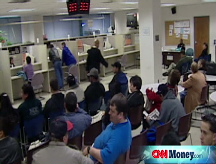Stocks: More pain, more gains?
Stocks rallied toward the end of last week despite abysmal news on the economy. This week brings readings on housing, consumer spending and the trade gap.
NEW YORK (CNNMoney.com) -- The worst monthly jobs report in 34 years failed to send stocks lower late last week, begging the question of whether the market has finally found that elusive bottom.
Not likely, analysts say. But the stock gains on Friday and over eight of the last 10 sessions, despite a barrage of increasingly awful economic news, are certainly notable.
The week ahead tests the trend, as investors digest reports on housing, inventories, jobless claims, the trade gap, producer prices, retail sales and consumer sentiment. All are expected to show weakness. (For details click here).
The week ahead also could bring a breakthrough for the automaker industry, with Congress expected to come up with some sort of proposition to help the Big Three. GM, Ford Motor and Chrysler went to Capitol Hill last week to plead for a $34 billion bailout for the troubled industry. (Full story)
Polls show a majority of Americans don't want to see a government bailout of the automakers - not when so many other industries are ailing too. But economists say the impact to the economy and to the labor market should any one of the companies fail would be devastating.
And the last thing investors need is more abysmal news on the economy. On Friday, the government said the economy shed 533,000 jobs in November, and its September and October job-loss numbers were revised upward. In total, the economy has lost 1.9 million jobs in 2008, worse than what it lost in the 2001 recession. During the week, AT&T, JP Morgan and other companies announced more than 43,000 job cuts.
Early last week, the National Bureau of Economic Research confirmed what many have long assumed: that the economy is in a recession. NBER put the start date at around Dec. 2007.
"Given the economic environment we are in and the startling job loss in November, this would probably be as bad a time as I can think of to let the Big Three go without funding," said Stuart Hoffman, chief economist at PNC Financial Services Group.
Even with some sort of loan package, the companies will still restructure and shrink, but it's the difference between an orderly slowdown and a fast retreat, he said. And the economy is in no shape for a fast retreat.
Alternately, "if the auto funding matters get resolved, that is going to be a big boost for both consumer spending and the market psychology," said Tim Speiss, head of the Wealth Advisory Practice at Eisner LLP.
Stocks don't need any more bad news. Between closing at an all-time high on Oct. 9, 2007 and the recent low on Nov. 20, the S&P 500 shed 52%.
"The big question is how much of the negative news has been priced in," said Ryan Detrick, senior technical strategist at Schaeffer's Investment Research. "Was that 52% enough?"
Stocks have rallied 16% since that November low. While that's encouraging, Detrick said investors are bound to sell into year-end, with both individuals and professionals looking to cash out.
Last week, investors pulled roughly $12 billion out of equity mutual funds, after putting $!0.4 billion into funds in the previous week. Investors have cashed out of equity mutual funds in 16 of the last 18 weeks.
Tuesday: The Pending Home Sales index for October is likely to add to evidence that the housing market hasn't bottomed yet. Sales likely fell 2.3% in the month after sliding 4.6% in September, according to Briefing.com forecasts.
Wednesday: October wholesale inventories are expected to have risen 0.2% after falling 0.1% in the previous month.
Thursday: The October trade balance is expected to have narrowed to $54.0 billion from $56.5 billion in September.
Friday: The November Producer Price Index (PPI) is expected to have fallen 1.8% after falling 2.8% in the previous month. The so-called "core" PPI, which strips out volatile food and energy, is expected to have risen 0.2% after rising 0.4% in October.
Retail sales are expected to have fallen 1.4% in November after falling 2.8% in October. Excluding volatile autos, sales are expected to have fallen 1.7% after falling 2.2% in October.
Business inventories are expected to have dropped 0.1% in October after falling 0.2% in September.
And consumer sentiment is expected to improve modestly, with the University of Michigan's index expected to rise to 58.0 from a previous read of 55.3. ![]()



